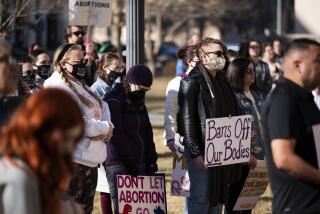Searle Will End IUD Sales, Cites Insurance Problems
- Share via
G. D. Searle & Co., saying that it is unable to get enough insurance to protect itself from personal-injury lawsuits, announced Friday that it will withdraw from the U.S. market two intrauterine birth-control devices, one of which is the nation’s most-prescribed IUD.
“We and many physicians deeply regret this action because it limits the choices of the American public in birth-control methods,” said Tod Hullin, vice president of communications for Searle, in a written statement. “Searle has made this decision because of mounting unjustified litigation in the United States that has made future product-liability insurance virtually unobtainable.”
The IUDs are marketed under the trade names CU-7, which is the most-often prescribed device, and Tatum-T. The CU-7 was approved by the U.S. Food and Drug Administration in 1974, and the Tatum-T in 1979. They become the fourth and fifth IUDs to be withdrawn by manufacturers from the U.S. market since 1970, according to the FDA. The remaining product is Progestasert--a drug-dispensing IUD made by Alza Corp. in Palo Alto.
Pill Form More Popular
“It doesn’t surprise me,” said Scott R. King, who follows Searle for the Montgomery Securities investment house in San Francisco. The IUDs “weren’t a very profitable line for (Searle) and IUDs have become less popular as more women use oral contraceptives.”
Since 1973, use of IUDs has declined, from 10.2% of American women between ages 15 and 44 to 7.9% of that age group in 1982, according to the National Center for Health Statistics. By contrast, 22.4% of American women in that age range use the contraceptive pill, and use of the diaphragm has doubled during the same period, from 3.4% to 7%.
Searle, which had worldwide net income of $245 million on sales of $1.2 billion in 1984, before it was acquired last year by Monsanto Co., held about 80% of the domestic IUD market. In 1985, it sold about 350,000 of the products, worth about $11 million. Although company officials said about 1 million of its IUDs may now be in use, sales of the devices paled beside those of Searle’s largest-selling product, the low-calorie sweetener NutraSweet.
Susan M. Cruzan, at the Food and Drug Administration, said that the Searle decision was “strictly voluntarily, an economic decision by the company.”
She said that the federal agency, notified Friday of Searle’s decision, reviewed the Searle devices and found that their label advice to women about the risks involved with IUD use was adequate.
Searle, based in Skokie, Ill., said that discontinuing sales of the IUDs in the United States would have no material effect on its earnings. Company officials said that Searle has sufficient reserves and insurance to cover the costs of pending litigation.
Sharp Rise in Lawsuits
But Searle’s action dramatized the financial impact that product-liability litigation can have on American companies, particularly those in the health care field.
Five months ago, A. H. Robins Co. of Richmond, Va., reacting to a flood of lawsuits over its Dalkon Shield intrauterine device, filed for protection from creditors under federal bankruptcy laws. Legal costs stemming from a decade of Dalkon Shield cases exceed $100 million, and Robins and its insurer have paid awards and settlements totaling $378.3 million in 9,230 cases, company officials have said.
The number of product-liability claims of all kinds in federal courts has skyrocketed to about 11,000 lawsuits in 1984 from fewer than 2,000 cases in 1974, according to the Administrative Office of the U.S. Courts. In the wake of the increased litigation, liability insurance coverage has become more difficult and more expensive to acquire.
Searle’s IUDs, which have been on the market for 12 years, were the subject of 775 lawsuits, Hullin said. Most of the lawsuits contend that the IUDs caused sterility or infections caused by bacteria that entered the uterus by way of a monofilament string attached to the device. Of those lawsuits, 470 have been disposed of and 305 are pending, he said. The company has not disclosed how much it has paid to settle or defend itself in such cases.
Some Claims Disputed
Another Searle spokesman, Steven Dickinson, would not elaborate on the difficulties the company had encountered in trying to find product-liability insurance, but he described the IUD liability claims as “unfounded.”
He cited two cases, one in which a woman lawyer contended that the IUD had caused sterility although she was pregnant at the time of the trial. In a second case, he said, a woman claimed her sterility was caused by the IUD when, in fact, her Fallopian tubes had been tied.
“The cost of such litigation and the non-availability of insurance made this (the manufacture of IUDs) no longer economically sensible,” Hullin said in a prepared statement.
The lone remaining American manufacturer of IUDs, Alza Corp. in Palo Alto, said that it would not be deterred by the experience of other IUD makers.
Competitor Now Lone Maker
“We’ve been in the market the last 10 years, and we intend to stay in it,” said Alza spokeswoman Bonnie Burdett. “I would guess that sales would increase in light of their (Searle) decision.”
Burdett said that since Alza began making its Progestasert IUD, it has paid less than $250,000 in claims for all of its products, which include oral contraceptives as well as drugs used to treat glaucoma, angina and other diseases.
Women who are currently using the Searle IUDs “can still use them” for the time approved when they were inserted, FDA spokeswoman Cruzan said. She explained that the FDA approved both the CU-7 and the Tatum-T for use up to three years.
More to Read
Inside the business of entertainment
The Wide Shot brings you news, analysis and insights on everything from streaming wars to production — and what it all means for the future.
You may occasionally receive promotional content from the Los Angeles Times.










